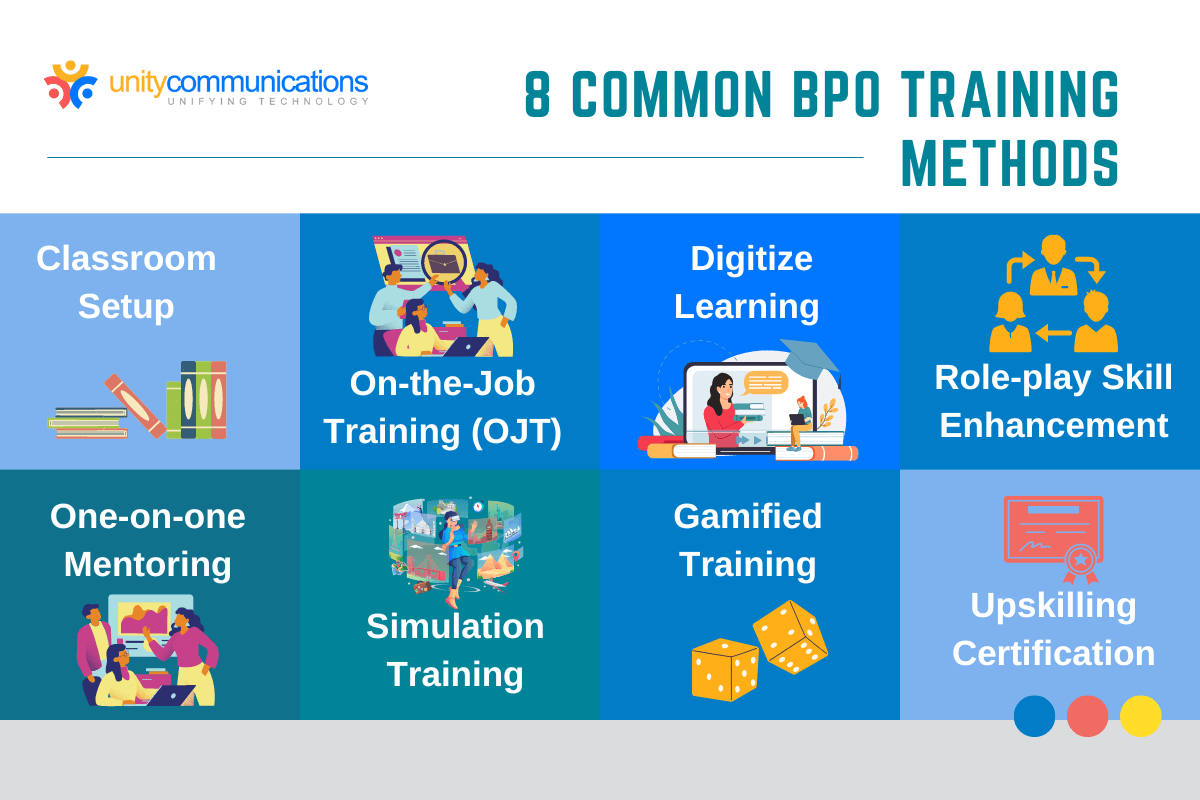Table of Contents
“Practice makes perfect” is what you always hear when trying to achieve a goal. The same idea goes for business process outsourcing (BPO). Service providers value continuous employee training to ensure consistently high-quality output amid fast-paced market competition.
BPO companies thus invest in training and career development programs to empower their team members. They implement different training methods to keep their staff ahead of the curve.
Continue reading to learn more about how service vendors effectively handle BPO training.
Why Is BPO Training Important?
Employee training is a crucial growth strategy for every BPO provider and employee. According to a 2022 Society for Human Resource Management (SHRM) report, 55% of polled personnel need more training to perform better. Meanwhile, 86% of surveyed HR managers believe training helps attract and retain talent.
Training is not a one-time activity that takes place after the time to hire is over; rather, it is a regular activity for employees. With comprehensive and specialized training programs, BPO companies let workers gain the knowledge and skills to do their jobs effectively. Training further boosts their productivity and performance, enhancing service quality and client satisfaction.
8 Common BPO Training Methods

Just as service providers aim to achieve returns on investment (ROIs), their employees also seek to spend their time and effort wisely at work. Professionals want to progress in their roles, and they want to learn new skills in a setting that contains a social element.
So, whether dedicated or shared agents, BPO companies use the methods below to make training more relevant to their teams’ jobs.
Learn Through a Classroom Setup
BPO team members partake in face-to-face instruction within a classroom environment. Skilled instructors deliver lectures and engage participants in interactive exercises covering various topics, including technical and soft skills, compliance, and safety. This method offers numerous advantages, including
- Personalized and focused attention
- Immediate feedback
- In-person collaboration and interaction
Train on the Job
Service providers implement on-the-job (OJT) training, enabling employees, especially newcomers and interns, to gain practical experience in actual work scenarios.
This hands-on and experiential training encompasses mentoring, job shadowing, coaching, and rotational assignments. Participants acquire practical skills, including using specific on-site equipment and software, while becoming familiar with new processes and workplace policies.
Digitize Learning and Training
Leveraging technology, service providers digitize learning materials, fostering cost-effective skill enhancement programs for their workforce. E-learning platforms facilitate the delivery of educational content and training materials over the Internet.
This web-based training model offers flexibility and scalability, enabling employees to learn at their own pace and convenience. Alternatively, learners can engage with instructors through virtual classrooms, webinars, or live-streaming sessions.
Role-play Skill Enhancement
Employees engage in role-playing exercises, where they practice and simulate real-life situations to enhance soft skills such as customer service and conflict resolution. This method, whether conducted in person or virtually, empowers workers to build confidence in addressing challenging scenarios.
Enable One-on-one Mentoring
Tailored to individual needs and preferred learning styles, one-on-one mentoring involves mentors guiding their mentees in skill development, knowledge acquisition, and self-confidence building. These mentors provide invaluable advice on soft skills, encompassing leadership, communication, and career advancement.
Simulate Training and Skill Development
Certain BPO companies create or utilize simulated environments to prepare employees for real-world work scenarios. Simulation training finds particular utility in high-risk or hazardous industries like healthcare, manufacturing, and real estate, where it serves to ease the training process.
Gamify and Make Training Fun
Service providers infuse gamification into training programs, making the learning experience engaging and enjoyable for employees.
Gamified training incorporates rewards, badges, and challenges into the training curriculum. It is particularly well-suited for roles involving repetitive tasks and heightened market competition, including marketing, sales, and customer service.
Certify Training and Upskilling
BPO providers utilize training and upskilling certifications to validate their employees’ successful completion of career development courses. These certificates attest to workers’ knowledge and skills, enhancing their competitiveness in the job market and opening doors to career opportunities. Furthermore, certification underscores an individual’s commitment to continuous professional growth.
What To Gain From Effective BPO Training?

According to a 2022 survey by TalentLMS, 85% of HR managers said training results in organizational growth. Meanwhile, 90% reported that skill development and enhancement programs increase employee productivity. So no matter what method service providers use, training positively impacts their workforce, business, and clients in the following ways:
- For Employees: Training helps employees stay up-to-date with the latest solutions, which lets them work with enhanced accuracy and speed. It sustains a positive work environment and boosts employee morale. Training programs reflect how companies value employees’ growth, resulting in increased job satisfaction and loyalty.
- For Employers: BPO training enables service providers to maintain a competitive advantage. A well-trained workforce can deliver better quality service, accelerated response time, and improved efficiency. This differentiates BPO companies with effective training methods from their competitors.
- For BPO Clients: Highly trained BPO workers adapt to changing client needs. They quickly learn new skills and processes to meet their clients’ requirements according to deadlines. Thus, clients can focus on improving their core products and services.
Best Practices for BPO Training

While exploring what BPO is, you must understand how service providers train their staff. Such insights guarantee that you partner with third-party workers trained to meet your desired output. To begin, providers follow some best practices for employee training.
- Establish clear objectives to see what needs more work and what results you need to achieve by the end of the training.
- Perform a training needs analysis (TNA) to determine employees’ needs, ensuring the training program matches their preferences and capabilities.
- Maximize various training methods to keep workers engaged and interested, accommodating their different learning choices.
- Provide regular feedback to team members during training sessions, helping pinpoint their strengths and weaknesses.
- Encourage workforce engagement by establishing a supportive and collaborative learning environment through active discussions and activities.
- Set regular training schedules biweekly or monthly to ensure continuous skill development.
- Assess the training program’s effectiveness by collecting employee opinions for enhancements.
The Bottom Line
BPO training is critical to advancing providers’ operations and service offerings. Service providers value workforce upskilling and development to strengthen their competitiveness in the diverse business landscape.
Hence, BPO companies use various training methods and best practices to meet their teams’ learning necessities and training preferences. Each approach brings significant advantages for employees, employers, and client organizations.
Knowing how service vendors handle staff training, are you ready to entrust your processes to a third party? Let’s connect; Unity Communications has well-trained and highly skilled workers to satisfy your daily needs and streamline your routine tasks.



